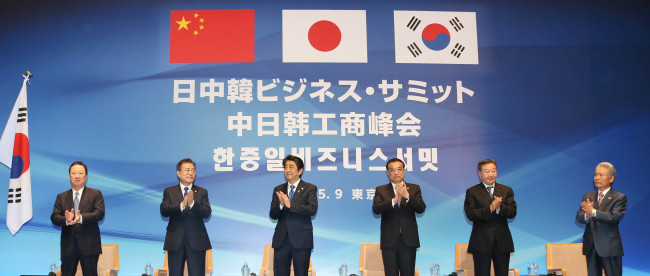A trilateral business summit attended by leaders and business representatives from Korea, Japan and China took place in Tokyo on Wednesday, jointly hosted by the Korea Chamber of Commerce & Industry, the Japan Business Federation and the China Council for the Promotion of International Trade.
 |
| Park Yong-man (from left), chairman of the Korea Chamber of Commerce, President Moon Jae-in, Japanese Prime Minister Shinzo Abe, Chinese Premier Li Keqiang and CCPIT Chairman Jiang Zengwei attend a trilateral business summit among Korea, Japan and China held in Tokyo on Wednesday. (Korea Chamber of Commerce) |
The meeting held on the sidelines of the trilateral summit was also attended by Korean President Moon Jae-in, Japanese Prime Minister Shinzo Abe and Chinese Premier Li Keqiang.
Fifteen Korean business leaders also joined including Chairman of the Korea Chamber of Commerce Park Yong-maan, Samsung Electronics CEO Yoon Boo-keun, Hyundai Motor President Chung Jin-haeng, LG Electronics CEO Cho Sung-jin and the heads of Lotte Holdings, GS, CJ, LS and Amorepacific.
During the meeting, the attendees agreed to cooperate on accelerating free trade among the three nations through trilateral trade deals and the Regional Comprehensive Economic Partnership, according to the Korea Chamber of Commerce & Industry.
RCEP is a megaregional economic agreement being negotiated between the 10 ASEAN governments and their six free trade agreement partners, including Korea, Japan and China.
A day earlier, Paik Un-gyu, minister of trade, industry and energy, met with Hiroshige Seko, minister of economy, trade and industry, in Tokyo to discuss bilateral economic cooperation and investment, according to the ministry on Wednesday.
During the meeting, the two sides shared the view of economic expansion by creating new business models using next-generation technologies between the two nations.
Park suggested resolving the uncertainties of new renewable energy through new technologies, including the internet of things, artificial intelligence and big data. He proposed creating economies of scale through bilateral cooperation in the areas of self-driving cars and hydrogen powered cars.
Seko shared the view as Japan is now fostering self-driving cars powered by hydrogen and dispersal power management utilizing information technologies, with the aim of making renewable energy a key part of its energy supply.
By Shin Ji-hye (shinjh@heraldcorp.com)

